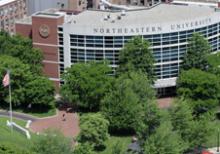
Northeastern has been recognized in “The Princeton Review’s Guide to 311 Green Colleges: 2011 Edition.” Photo by Mary Knox Merrill.
While Northeastern University’s school colors may be red and black, it has once again been honored for being “green.”
Northeastern is among the institutions recognized in “The Princeton Review’s Guide to 311 Green Colleges: 2011 Edition,” which highlights the nation’s most environmentally responsible “green colleges.” The guide, in its second year, lists 308 institutions in the United States and three more in Canada that “demonstrate notable commitments to sustainability in their academic offerings, campus infrastructure, activities and career preparation.”
The Princeton Review released the list in collaboration with the U.S. Green Building Council, known for developing the LEED green building certification program.
The honor is the latest example of Northeastern’s commitment to sustainability, one of the University’s top research themes, along with security and health.
In 2007, the University became a founding member of the American College & University Presidents Climate Commitment, a nationwide initiative to neutralize greenhouse gas emissions among institutions of higher learning. In 2010, Northeastern officially adopted a climate action strategy called “Sustainable Action Plan: Roadmap towards Carbon Neutrality.”
In addition, the Sustainable Endowments Institute, one of the most rigorous assessors of sustainability practices on college campuses, last year awarded Northeastern one of the highest ratings in North America on its 2011 College Sustainability Report Card — an A-, which was the highest of any Boston-based university. The report card also named Northeastern an Overall College Sustainability Leader, and, for the fourth-consecutive year, Campus Sustainability Leader.
Last year, Northeastern was also among 18 colleges and universities selected to The Princeton Review “2011 Green Rating Honor Roll” for its outstanding commitment to campus sustainability through environmental policies, practices, and academic offerings.